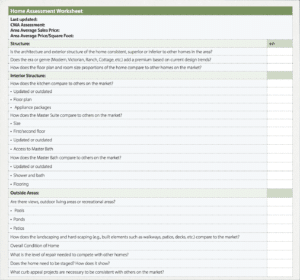
There are currently more than two million real estate professionals in North America.1,2 With so many options to choose from, how does a prospective home buyer or seller choose the right agent or broker? According to the National Association of Realtors®, trust and reputation are the top deciding factors consumers use when hiring an agent.3
But how do you measure trust and reputation … and what criteria can be used to help you make your decision?
In this guide, we’ve outlined the top attributes that amazing agents possess, as well as the questions you can ask to make sure you’re working with the right market expert to achieve your real estate goals.
5 ATTRIBUTES OF AN AMAZING AGENT
As we mentioned above, not all real estate professionals are the same. And it’s easy to be overwhelmed by the options and information about working with real estate professionals to buy or sell your home. In fact, many real estate markets are oversaturated with agents.
To help you understand what makes top agents and market experts stand apart from the competition, following are five key attributes of an amazing agent:
- A Pricing Specialist
If an agent has their real estate license, they know the basics of the transaction process. They know what goes into buying and selling a home. However, there’s a difference between knowing the process and navigating it for an ideal result. This ideal result often means buying or selling a home for the best price.
For buyers, amazing agents have a strong understanding of market trends, competition, and how to make your offer attractive to sellers. They can help you identify and secure a deal to ensure you get the home you want, within your desired budget.
If you’re selling a home, market experts have experience pricing homes optimally for the market, and creating pricing plans to minimize the time spent selling the home. This will help you sell for your desired price, and avoid costs like additional mortgage and utility payments.
| Takeaway: Whether buying or selling a home, pricing can be tricky. Market experts can help navigate best-possible pricing strategies, and also secure the home you want within your budget. |
- An Effective Time Manager
It’s common to underestimate the amount of time it takes to buy or sell your home. The average real estate agent may not be utilizing the latest tools and technology to make the transaction easier and more cost effective for their clients. Market experts have tools and strategies at their disposal to minimize the amount of time you spend on the process.
For sellers, market experts can make sure you only deal with qualified buyers, not the “window shoppers” who can waste your time. We also utilize the latest marketing practices to advertise and price your home effectively, ensuring it gets sold quickly.
When looking to buy a home, inexperienced agents may waste your time by showing you homes that are not a good fit for you. A market expert knows how to prioritize your needs and wants to find you the ideal home within your budget. They also know how to spot “red flags” and can steer you away from homes that are likely to turn up major issues in a real estate inspection, saving you time and money.
In addition, well-networked Realtors can gain access to the hottest listings before many websites do. Their extensive professional networks can help identify “pre-list” homes before they’re officially on the market. This can be invaluable in a highly-competitive real estate market.
| Takeaway: Even a well-intentioned agent may not have the skills, tools or technology to make the experience easy for you. There are lots of hidden activities that may take up unexpected time, and a market expert will save you time and energy. |
- A Market Insider
While most agents can pull market stats about a neighborhood, community or city, they may not understand important trends or developments that would affect your transaction. These can include the state of the school district, issues with a homeowner association, new businesses in the area, zoning rules or trends in home prices.
Market experts live and breathe local real estate and know the trigger points for buying and selling in this market. We also stay current on effective marketing and negotiation practices, resulting in our track record of success.
For sellers, we understand what features of your home and neighborhood are assets in the selling process. And for buyers, we share a deep understanding of market factors, including school and neighborhood quality, crime statistics, speed of sales and more.
| Takeaway: Getting relevant and specific market knowledge can be difficult and time consuming, which is why many real estate agents don’t have it. Whether you’re buying or selling a home, an experienced real estate agent is often the best source of information about a city, neighborhood, or even street … we’re literally conducting market research every day. |
- A Strong Negotiator
Amazing agents truly set themselves apart in their ability to negotiate. Unfortunately, a large portion of agents don’t commit their full time to increasing this key skill.
Real estate negotiations can be challenging, even for seasoned professionals. It takes skill, experience and a knowledge of how to fight for your client’s best interests. While any agent can enter negotiations to buy or sell a home, they may not know the effective strategies to exit those negotiations with the result you want.
Experienced Realtors focus on negotiation as a key skill. We understand what to do before entering negotiations (establishing the upper hand to set up the best outcome), as well as during the process (when to offer or accept concessions).
| Takeaway: Many agents can feel the stress of the negotiation process, and may agree to terms of the buyer/seller. Working with a market expert will help ensure you get the best deal, not just the fastest deal. |
- An Effective Closer
Closing a deal fast is often a good thing. For buyers, it means you found the home you wanted quickly. For sellers, it often means you can avoid the added expenses of mortgage and utility payments, and maximize the value of your home sale.
However, an agent solely focused on speed can make decisions that aren’t in your best interests. Top real estate professionals know how to not only achieve your real estate goals quickly, but in the right way to avoid potential pitfalls.
Just like negotiations, the paperwork and process of closing a real estate transaction are complicated. And they can be overwhelming for the average agent who hasn’t handled a lot of transactions. Sales contracts, property disclosures, occupancy agreements and even lead paint records need to be executed with precision. Your agent not only needs to be familiar with these, but also stay current on any changes in requirements or regulations.
Market experts have a strong understanding of real estate contracts, timelines, clauses and contingencies within the closing process. In fact, avoiding pitfalls during the closing process is where many sellers find an experienced Realtor is a huge asset.
| Takeaway: Many agents don’t have a firm understanding of contracts. Because a real estate transaction often involves a significant investment, even a small mistake can mean serious trouble. With that in mind, it’s often best, and most responsible, to work with a true market expert. |
5 QUESTIONS TO ASK YOUR REAL ESTATE AGENT
So how do you know if you’re working with an amazing agent?
The first step would be to “shop around.” Many people work with the first agent they come across without a firm understanding of their level of experience. It’s always a good idea to interview a number of agents before selecting one. If you’ve gotten referrals from people you trust, then you may only need to interview 2-3 agents.
However, it can be tough to know what to ask in the interview process. Here are some questions that can help you qualify the best agent to help you achieve your real estate goals:
- Can you send me some information about yourself?
Look for professionalism and consistency. What are their professional accomplishments? Also, try to identify how they approach their work. Look for a business person who has a strategy and solid support system. If they’re a newer agent, ask about their team’s dynamic and accomplishments.
- How long have you been in real estate?
The average Realtor has 10 years of experience4. But while longevity is important, even more telling are the number of transactions they have closed or been involved in. So feel free to also ask: “How many homes have you sold in this area?”
- What will you do to keep me informed?
Do you want daily or weekly reports from your agent? Will the agent be able to meet these expectations? Determine how much communication you want, and then find an agent who will give you the attention and time you want and deserve.
- Can you provide me with further resources I may need?
From market reports and pricing trends to school performance and crime statistics, top agents have resources at their disposal. In addition, market experts have built strong relationships with their extended team of professionals, and can often get expedient service or be able to “cash in a favor” for you should a need arise.
- Seller only: Can you share with me your plan to market my property?
Many agents will simply put your home in the MLS and wait for it to sell. An amazing agent should have a detailed plan of how to get your home exposure on social media, to their local networks, and more.
GET STARTED
Now that you’re armed with the 5 Attributes of Amazing Agents and the Top Questions to ensure you work with the best possible real estate agent, you’re ready to start interviewing agents.
We’d love an opportunity to win your business. Schedule a free consultation with us to find out how true market experts can help you achieve your real estate goals!
At Karen Cannon, Realtors, we are local real estate experts for Dunwoody, Sandy Springs and North Atlanta. We live, work and play here, and our agents are hand-picked for their connections in the community. Our clients know about homes coming on the market before anyone else. And our highly effective marketing program allows us to shorten the number of days on the market. We’ve even put homes under contract sight unseen!
If you are thinking about selling your home, or are interested in moving into Dunwoody, Sandy Springs or the surrounding areas, call us at 770-352-9658.
Sources:
- National Association of REALTORS – https://www.nar.realtor/field-guides/field-guide-to-quick-real-estate-statistics
- Financial Post – http://business.financialpost.com/personal-finance/mortgages-real-estate/canada-housing-bubble-agents/wcm/b49d4e3a-bd8d-4d1c-9566-bd3d80c8e23a
- National Association of REALTORS – https://www.nar.realtor/reports/highlights-from-the-profile-of-home-buyers-and-sellers
- National Association of REALTORS – https://www.nar.realtor/field-guides/field-guide-to-quick-real-estate-statistics



